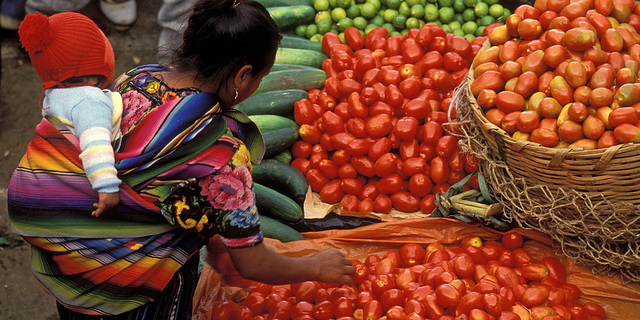
Guatemala will become the first WAVES country to undertake agriculture accounts to inform their pressing food security issues. This will be in addition to their focus on water, forest and energy accounts.
There is a demand to get better statistics and data on agriculture and its link with the environment. This information will be valuable for designing policies for achieving better efficiencies for the sector as a whole. It will provide information on how agriculture can optimize the use of ecosystem services while causing the least damage to them.
Food security is a priority area in the current National Plan for Guatemala. The United Nations System of Environmental and Economic Accounting (SEEA) has a framework for agricultural accounts and this will also be an opportunity to test some of the methodologies in the SEEA-Agriculture volume.
The WAVES team was accompanied by Carl Obst, editor of the System of Environmental and Economic Accounting for Agriculture (SEEA-Agri). He held several meetings with technical experts and recommended changes to the existing system of accounts to strengthen them.
Guatemala already has a rich history of constructing accounts and as a WAVES partner country will be focusing on how rich information generated by the accounts can inform policy. In a significant step, a key national university is exploring the idea of embedding natural capital accounting in the core curriculum of economics course for undergraduates.
Two events were held last week to consult and coordinate on agriculture accounts – one, with technical staff from 10 government agencies related to natural resources, agriculture, and food security. The second one was held at the Central Bank with national accounts technical experts, staff from the planning agency and others. Both events featured presentations by Carl Obst, Jaime Carrera, an expert on water accounts, and Ricardo Martinez-Lagunes, Inter-regional Adviser on Environmental-Economic Accounts from the United Nations Statistics Division, who joined via videoconference. The aim of both workshops was to discuss the SEEA-Agri and how it can best be applied to Guatemala.
Initial conversations were held with representatives from the Secretariat of Planning, the Ministry of Agriculture, the Presidential Secretariat for Food Security, the National Institute of Statistics, as well as large producer associations for coffee, sugar, and palm.
The visiting team also met with representatives from partner agencies like the Food and Agriculture Organization (FAO) and the United Nation’s Development Programme (UNDP) in order to better coordinate work related to natural resources in Guatemala.
